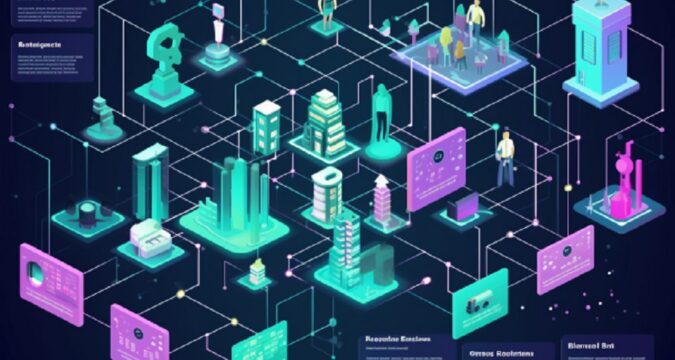
The correlation between blockchain and artificial intelligence (AI) has numerous advantages, particularly in data sharing and privacy. In the AI ecosystem, large-scale datasets are crucial, but privacy concerns often limit sharing of such data.
However, the answer is found in the decentralized architecture of blockchain. As a platform devoid of a central authority, blockchain presents a solution by facilitating secure collaboration and data sharing among multiple entities.
Relationship Between Blockchain And AI
By promoting trust and upholding data control, blockchain empowers individuals to retain authority over their data while granting AI algorithms access based on the required information. This will bridge the gap between data sharing and privacy, unlocking new possibilities for AI advancements.
Moreover, the immutable nature and tamper-proof feature of blockchain technology significantly enhance the reliability of AI systems. The transparency afforded by blockchain enables the creation of a valid audit trail, ensuring that the data employed for AI development remains authentic and unmodified.
Thus, this attribute holds particular value in industries where data quality and reliability are pivotal, such as healthcare or finance, where accuracy and data integrity are vital to their operations.
What Are The Benefits Of Combining Blockchain And AI?
Improved data integrity
By leveraging the qualities of immutability and transparency, blockchain technology can enhance the integrity of data utilized within the AI space. Through blockchain, AI algorithms can access data resistant to tampering, providing a secure and verifiable foundation for generating accurate forecasts and insightful analysis.
A notable application of blockchain in this context is supply chain management, which can be employed to track and document the movement of items. AI systems can subsequently analyze the recorded data to identify patterns, detect anomalies, and optimize logistics operations.
Data Sharing And Partnership
It is critical to have access to diverse and extensive datasets to harness the power of AI systems. Blockchain technology presents a robust and decentralized platform that ensures the safety and integrity of data sharing.
By leveraging blockchain, multiple entities can collaborate on data sharing without relying on a single central authority, hence upholding privacy and control over sensitive information.
Tokenization And Rewards
The unique capabilities of blockchain technology enable the creation of tokens that serve as valuable tools for incentivizing and monetizing AI platforms. These tokens can be used as rewards, compensating individuals who contribute computational resources and train models.
Such incentive mechanisms foster collaboration, teamwork, and active participation in AI research and development activities.
Using Blockchain And AI In Different Industries
The integration of blockchain technology ensures the immutability and transparency of data within supply chain management. Thus, it enables AI algorithms to analyze this information and enhance logistics operations while detecting operational loopholes.
In pursuing secure food supplies, notable collaborations have emerged, such as the partnership between Walmart and IBM. Both conglomerates have joined forces to leverage blockchain and AI for tracking and monitoring the movement of food products, ensuring their safety and integrity throughout the supply chain.
Similarly, blockchain technology integration offers many benefits in the healthcare sector, including safeguarding private patient information and establishing secure channels for sharing medical records. Hence, AI systems can leverage such data to develop personalized treatment plans and enhance diagnostic capabilities.
Challenges Of Using Blockchain And AI
Scalability issues pose a significant challenge when integrating blockchain networks with AI systems. The real-time processing of large volumes of data and the computational demands can overwhelm blockchain networks.
Additionally, both blockchain and AI technologies are computationally intensive, raising concerns about their environmental impact. Also worth considering is data security and privacy, as AI may process sensitive data that needs protection while blockchain guarantees the safety of immutable data.
Consequently, it isn’t easy to compromise the two technological features in some industries. Meanwhile, emerging trends in blockchain technology and AI integration include federated learning, AI-based marketplaces, and AI research and development advancement.




